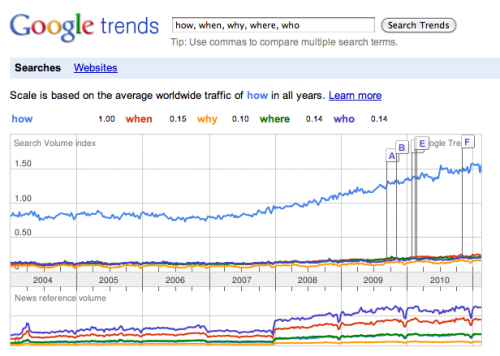Where, Why, When & How To Benefit From Google’s Farmer Update
I’m sure everyone has read about Google’s recent algorithm change to penalize content farms by now. There’s been lots of reports on who the biggest losers have been in terms of traffic loss, but for everyone who’s lost – someone else has won! So looking at this from the alternative point of view, how can […]
I’m sure everyone has read about Google’s recent algorithm change to penalize content farms by now. There’s been lots of reports on who the biggest losers have been in terms of traffic loss, but for everyone who’s lost – someone else has won!
So looking at this from the alternative point of view, how can you benefit?
Well firstly, it’s important to look at where the content farm style of websites went wrong. Quite clearly, one of the common signs is that they created not just thousands, but in many cases millions of pages containing low-quality content. All with the primary intention of generating search engine traffic.
That’s a big mistake to avoid, huge volume and low-quality is a clear sign of content which will no longer rank so easily in Google. But that doesn’t mean the search demand has gone, people are still searching for the same terms – so the potential traffic is still there.
If anything, it’s just got a whole lot less competitive, so many people will be benefiting from this update too.
Target The Long Tail
What I would recommend looking at is how you can target this for maximum benefit. In terms of scale: don’t try and target every keyword possible, that’s where the content farms went wrong.
Instead, keep your focus narrow – become a specialized authority within your industry or niche and instead of just churning out hundreds of articles, make sure you create quality content which adds value.
But when you do this, keep the long tail of search in mind – what is your target audience searching for? What are common questions they would ask or type into a search engine?
Do some research, look at the keywords which appear when you type “Why/How/What/Who [industry term]” into Google Instant:
(Interestingly, ehow.com is still number one for the above search – let’s see if that will remain true.)
As a first step, I would recommend you do some fresh keyword research, try using Google Trends, your favorite keyword tool and most importantly your analytics package.
Dig deep into your own traffic to find common terms or trends of searches. Examples of frequent searches are likely to be those such as why, how, when, who, what etc – but this may vary based on your audience and industry.
Once you have this information, you can start to put together a very useful list of keywords to base your content plan and strategy around. And following this, I would look to decide where these content ideas would be most suitable to publish, in many cases it’s most likely to be appropriate as blog content, but it depends on your site.
In other cases, it may involve re-writing, or extending, existing website content, or perhaps publishing common questions in an FAQ section may be a good option.
Whatever your content strategy is, there are a lot of keyword opportunities out there – and it’s something you should have been thinking of well before Google’s announcement, but it might be a good time to now revisit your content strategies and look at new ways to capture additional organic search engines visits.
What Does Google Consider High Quality Content?
One of the biggest problems with content farms is the fact that it’s low quality content – yes it’s unique, so that’s a good start and that used to be a good enough reason to get top rankings when hosted on a strong domain. But moving forward, it’s going to take a bit more than that.
If you think about this from Google’s point of view, what do they look for to signal high quality content? The answer is pretty simple: links.
If you’ve got content which has generated links directly to that page then it’s probably going to be far more likely to rank in the search engines now – not that links were a poor algorithm factor before, it’s just likely to have become even more important recently!
This means strong domains could struggle to just rely on average/poor content in order to generate search engine traffic. That means you have to create high quality content which can attract as much natural links, blog attention, social media bookmarks/shares etc as possible – signaling to Google that it’s worthy of ranking highly.
So while the algorithm change is bad news for those viewed as content-farms, it doesn’t have to be negative for everyone. It does open more opportunities with less competition for those who can provide true value in their content.
Contributing authors are invited to create content for Search Engine Land and are chosen for their expertise and contribution to the search community. Our contributors work under the oversight of the editorial staff and contributions are checked for quality and relevance to our readers. The opinions they express are their own.
Related stories
New on Search Engine Land

